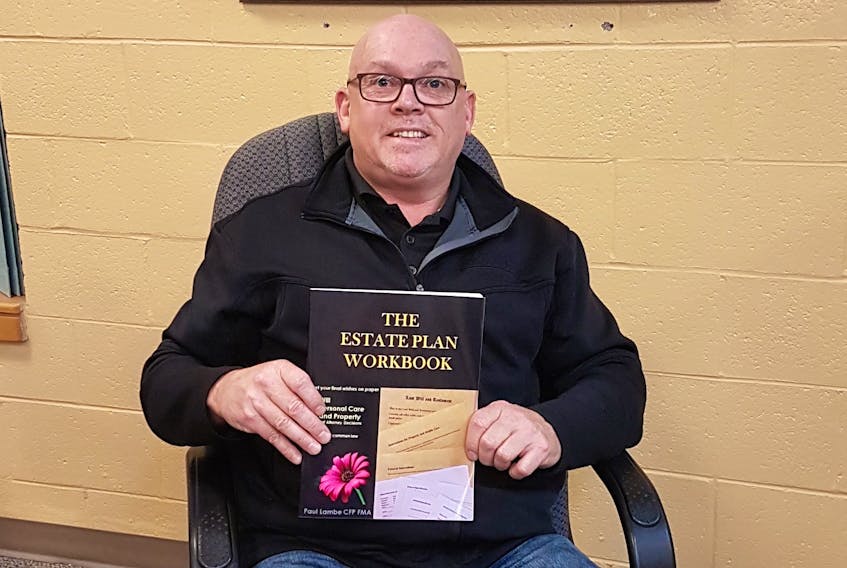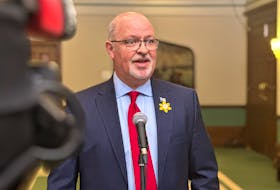Dying can be a taboo topic that people often don’t want to talk or even think about.
It happens to people young and old every day, though, and not having an estate plan in place with a thorough will detailing your final days and what comes after can be messy for those left behind.
“Dying without a will, there’s a hell of a lot of issues that come up that people don’t know about,” says Paul Lambe, a certified financial planner, who is originally from St. Lawrence.
Lambe has self-published “The Estate Plan Workbook.”
Any number of things can go wrong without a solid estate plan, Lambe says, who recently walked The Southern Gazette through a few examples.
One not known by a lot of people, particularly young couples with children, involves buying a house.
Most of the couple’s disposable income goes into paying for the mortgage. There is no will and the house is not jointly owned. One spouse dies and insurance covers the balance of the mortgage. The home is essentially the estate.
Rules vary by province in Canada, but in Newfoundland and Labrador the other spouse is entitled to a half share of the estate.
Say the couple has one minor child, the other half goes to them. Under that scenario, Lambe says the public trustee’s office takes control of those assets for the child.
If the surviving spouse has the financial wherewithal, they can keep the home. However, they may have to provide the public trustee’s office with the funds until the child reaches the age of majority.
“Now most people would not want to kick their wife and child out of the house and have that happen, especially at a time where the surviving spouse is now a single parent having to raise a child,” says Lambe, adding he’s witnessed that one in particular happen numerous times.
Another he’s seen often involves second marriages where there are kids from the first marriage.
Lambe described a scenario where a new spouse is eventually named beneficiary of the estate, but there is no provision for the older children. Again, a house, this time jointly-owned, is the only asset. The home goes to the living spouse even though the intention was to leave something for the children from the first marriage. If intent can be shown, judges have ruled in favour of the children. If not, however, they potentially receive nothing.
The result is fighting and arguing, and families that no longer are on speaking terms.
“You can have a very cohesive family, but when it comes down to money in the end, it can change very quickly,” Lambe says, “and a lot of parents or people out there don’t think it’s going to happen to their kids, but I’ve seen it happen and it does happen.”
It’s thought that as many as 50 per cent of adult Canadians don’t have an estate plan in place.
“People just don’t understand the need, and people need to understand the different issues and make good decisions,” Lambe says.
‘The Estate Plan Workbook’
Paul Lambe has helped people settle estates for over two decades, so he knows there is a need for his new book.
Lambe worked as a certified financial planner (CFP) for a large financial services company in Ontario for about 17 years before heading out on his own as a financial and estate consultant for executors, trustees and power of attorneys.
About three years ago, with the economy still booming in Newfoundland and Labrador, an opportunity came along to come back to the province, and Lambe took a job with a big bank in St. John’s as a CFP experienced in estates.
After a while, the urge to be his own boss returned. This year he went back to consulting independently, giving him time to work on a few other projects, including a book to help people get their final wishes down on paper.
The result was “The Estate Plan Workbook”, which Lambe has self-published through Amazon’s CreateSpace.
Lambe says there a lot of complicated information out there about estate planning and it’s not written in a way that a layperson can follow easily.
When it comes to estate planning and wills, people are intimidated by the system, lawyers and costs, Lambe says.
The book is helpful for all common law jurisdictions, which includes all provinces in Canada except Quebec.
“I really wanted the tool to be very universal, and that takes a lot of time because you have to understand the different rules in different jurisdictions and make it relevant to all those areas, which is complicated and a big challenge,” he says.
“With research and experience, I believe I put together a very nice tool for people.”
Lambe’s book is available for order on Amazon.ca.









